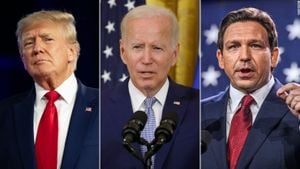The spotlight on international relations often zeros in on the giants: the United States and China. Recently, tensions escalated as the imminent transition of power looms over Washington, getting everyone buzzing about the potential changes to one of the world's most significant bilateral relationships.
During the recent Asia-Pacific Economic Cooperation (APEC) summit held on the sunlit streets of Lima, Peru, U.S. President Joe Biden and Chinese President Xi Jinping took to the not-so-simple task of discussing their complex relationship. The two leaders met amid murmurs of unease about how Biden's potential successor, Donald Trump, whose rise to power and aggressive economic policies disrupted the status quo previously, might shake things up.
The meeting between the two heads of state wasn't just another diplomatic chat; it was laden with the weight of the world's largest economies. Both leaders recognized the partnership they share must not morph from competition to conflict. Biden, reflecting on their dialogue, remarked, "These conversations prevent miscalculations." He emphasized how the past years have shown it’s actually possible to maintain this relationship, no matter the challenges.
Xi echoed this sentiment, extending his olive branch by stating, "China is ready to work with the new U.S. administration to maintain communication, expand cooperation and manage differences." He urged both nations to act with mindful consideration of global interests, injecting positive energy to alleviate the tumultuous global climate.
Their dialogues didn’t shy away from contentious issues, such as the geopolitical tensions surrounding Taiwan. Biden raised his concerns about China's military maneuvers near the self-governing island. Meanwhile, U.S. officials highlighted China's alleged role in hacking the communications of U.S. government officials, underscoring the need to uphold cybersecurity.
Yet, it wasn’t all doom and gloom. The discussions also included areas of cooperation, such as combating drug trafficking and exploring innovations around artificial intelligence. National Security Advisor Jake Sullivan mentioned, "We are now building a foundation for being able to work on nuclear risk reduction," hinting at new channels being created for dialogue on sensitive matters.
Still, the sense of optimism was marred by underlying tensions. Biden has previously branded Xi as "dictatorial"; meanwhile, Xi has criticized the United States for being the "biggest source of chaos". This tug-of-war is classic, but now with Trump’s impending return to power, serious questions loom about what the future holds.
Trump’s first term was characterized by fierce tariffs and trade wars against China, policies which sowed seeds of discord. His promises during the campaign to slap tariffs of up to 60% on Chinese imports underline the stark differences compared to Biden's more diplomatic approach. Xi’s plea to "unite and cooperate" to mitigate the impact of protectionist sentiments felt like foreshadowing of more strife, especially with the specter of Trump's potential policies looming large.
Historical grievances lingered throughout the meetings as they discussed the preservation of alliances. Biden’s extensive diplomatic outreach across Asia and his efforts to establish partnerships with nations like Japan and South Korea stirred concerns among leaders of those countries about Trump’s isolationist tendencies as he returns.
White House officials and analysts alike worry about the detrimental consequences of reverting back to heightened tensions. Economists have warned of the perils of Trump's tariffs impacting not just China but potentially backfiring on the U.S. economy as well.
While Biden focuses on building stronger coalitions through multilateral engagement, Trump’s presidency could see a retraction from global partnerships. Many fear his approach could result in America stepping back from international agreements, not only impacting trade but also the imperative actions on climate change.
Preparations for the G20 summit are underway, where Biden plans to voice concerns about global warming, alongside his impromptu stop at the Amazon. This engagement might serve not only as showcasing U.S. leadership on climate issues but as sending a clear message contrasting his administration's proactive stance against any impending Trump-led policy shifts.
The APEC summit brought attention not only to the tussle between these major powers but also to the broader issue of multilateralism, which both Xi and Biden advocated for. While Biden underscored the detrimental impact of China's economic dealings on American workers, Xi spoke about free trade and opening markets during APEC meetings, underscoring the ideological rift shaping the future dialogues.
Despite America’s growing concerns over practices deemed unfair by Beijing, Xi championed initiatives like the Regional Comprehensive Economic Partnership, highlighting China’s commitment to multilateral endeavors. Many analysts stress the significance of cooperative international relations versus isolationist agendas, urging leaders on both sides to weigh the consequences of their actions.
While the future of U.S.-China relations hangs on precarious threads, the foundations of dialogue laid during these summits act as lifeboats to weather potential storms. The underlying hope is for both nations to move away from heightened tensions and navigate their rivalry with caution. With the world watching closely, how effectively both leaders can strike this balance will dictate the course of not only their countries but also the global stage.
Biden’s meetings and appearances convey more than just cordial diplomacy; they signal a desperate bid to stabilize international relations amid rising tensions. The clarity on how the United States will approach its partnerships and adversarial relations under Trump remains shrouded in uncertainty. Yet for Xi, the stances taken now could very well evolve and either fuel or extinguish the flames of rivalry, as the world eagerly observes these titans poised on the edge of contention.



